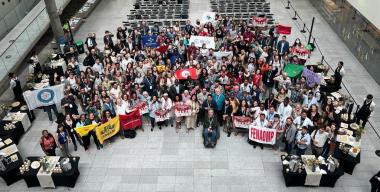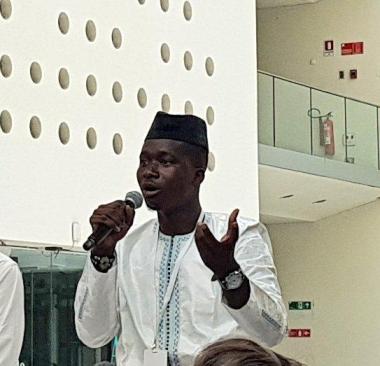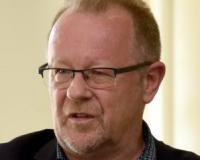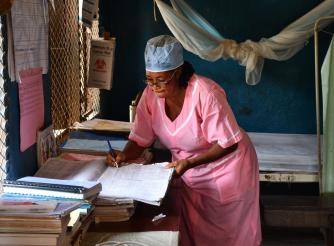ActionAid Joins Hundreds of Organisations Declaring That ‘Our Future Is Public’

In December 2022 an unprecedented gathering of movements working for public services and resisting privatisation took place in Santiago, Chile, titled Our Future Is Public. On 26th January 2023 the Santiago Declaration that came out of this conference is being launched, with the support of hundreds of organisations around the world. ActionAid International was one of the core organisers of the conference and our Global Lead for Economic Justice, David Archer, can be heard here outlining the significance of this unique gathering.
The ActionAid delegation to Santiago included:
- Wangari Kinoti, Global Lead for Women’s Rights based in Kenya
- John Nkaw, Ghana Country Director
- Roos Saalbrink, Policy Adviser on Economic Justice and Public Services based in the UK
- Maria Ron Balsera, Tax and Education Alliance Coordinator
- Ucizi Ngulube, working on education and tax justice in Zambia
- Al Hadji Moussa Sarr, working on education and tax justice in Senegal
- Arianna Kandell, Foundation Manager at ActionAid USA
- Fabiana Ferreira Alves, Campaigns Lead based in Brazil
Below are further details of the conference and the Santiago Declaration.

Why did this conference take place? And why now?
People around the world are struggling with the cost of living, public budgets are shrinking, and public sector workers’ wages are being squeezed impacting services provided. In this context, there is an urgent need for different social and economic justice movements, civil society organisations and public sector unions to come together, to share their experiences and analysis.
Why Chile?
Chile under the dictator Pinochet in the 1970s is widely regarded as the birthplace of the neoliberal economic model - which has been the dominant model globally for the past 40 years. The Chilean President, Gabriel Boric, a former student leader, declared that Chile would aspire to be the place where this model is also put in its grave. One of the clearest elements of this model has been the pursuit of austerity, leading to cuts in spending on public services.
When did it happen and who was there?
The meeting took place from 28 November until 2 December 2022 in Santiago. Over 450 people participated in person and over 1,000 people online, from over 100 countries. There were social movements, trade unions, human rights organisations, global networks and coalitions, international NGOs, youth activists and many more.
What public services were involved?
The delegation came from movements working on health, education, care, social protection, energy, housing, transportation, water and waste, food and agriculture. There were also representatives from cross-cutting movements working on economic justice, gender justice, climate justice and democratic ownership.
Why the link to economic justice movements?
There is a growing debt crisis in many countries meaning that governments spend more on servicing their debt than on education and health. Tax revenues are often insufficient to provide quality public services and insufficient attention has been paid to how to raise taxes in fair ways that pass the burden onto those most able to pay. The IMF continues to champion austerity policies prioritising debt payment that cut spending on public services rather than urging countries to increase taxes in fair ways.

How are public sector workers affected?
A central austerity policy is to cut or freeze public sector wages. Research by ActionAid, Public Services International and Education International found that IMF austerity cuts in just 15 countries have blocked the recruitment of over 3 million nurses, teachers and other essential public sector workers. In just those 15 countries, the recommended IMF cuts add up to nearly US$ 10 billion, undermining health, education and other public services. Our research shows that there is no credible evidence base behind these cuts.
How does this link to care and women’s rights?
When public spending is cut women are triply disadvantaged. Women and girls are the first to lose access to services when they are in short supply or when fees are charged. Women also lose some of the best opportunities for decent work in frontline public sector roles (most nurses and teachers are women). And women and girls end up as involuntary shock absorbers, assuming a disproportionate share of the unpaid care and domestic work that rises when public services fail. When cuts are made to public services such as health, elder, palliative and childcare, the need for care does not disappear, the responsibility is simply transferred from public to private – through entrenched social norms. Women’s unpaid care work subsidises not only the valued and measured economy but also the state's provisioning of goods needed to fulfil social and economic rights.
Why the link to the climate crisis?
The climate crisis is leading to rising violations in social and economic rights, with public budgets further stretched owing to the challenges of collapsing food systems and the urgency of adaptation and transition. The provision of quality public services and universal social protection should be at the core of a just transition, ensuring that the most vulnerable people are protected. The present global economic system acts as an accelerator of the climate crisis and fundamental changes are needed in both.
Why has this convergence not happened before?
Many people working to defend individual public services are so caught up in their individual struggles that it is not easy to find the time to connect with others. Yet it is increasingly clear that fights against privatisation in services one will never succeed whilst other services are being privatised. There is a common ideology that needs to be challenged, a cult of austerity. Of course, this did not come out of nothing. There has been work over many years to lay the foundations in a series of ground-breaking events since 2019 that brought together thousands of people online, and the adoption in 2021 of the Global Manifesto for Public Services and the related Manifesto on Rebuilding the Social Organisation of Care.
What happens next?
The Santiago Declaration includes at the end a call for action with many ideas for the next steps and commitments from the participants to work in solidarity between sectors and movements, building a collective analysis and supporting each other’s work and demands. There is a desire to rally forces behind iconic collective struggles, to invite each other to key meetings, share good practices and develop collective programmes and demands.
Read the declaration below



